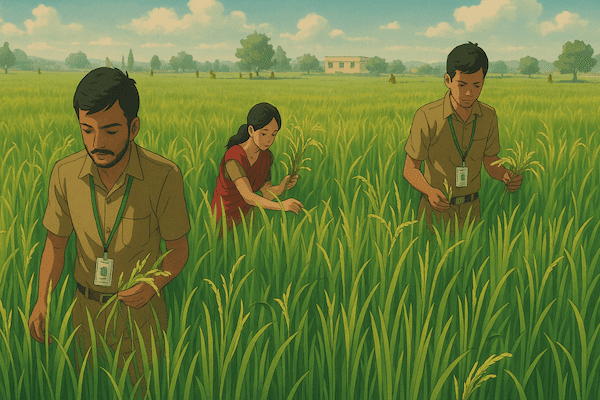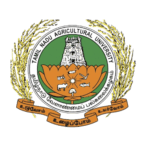Bachelor of Science in Agriculture
B.Sc. Agriculture program is a comprehensive 4-year degree focusing on the scientific, technological, and practical aspects of agriculture.It prepares students for careers in agribusiness, research, education, and rural development.

About The Program
B.Sc. (Hons.) Agriculture is a 4-year undergraduate degree designed to provide in-depth knowledge and hands-on training in all aspects of agriculture and allied sciences. The program combines science, technology, management, and social engagement to prepare students for meaningful careers in farming, agribusiness, research, and rural development.
Who Should Consider This Program?
- Students passionate about farming, food systems, or environmental sustainability.
- Those interested in science-based learning with practical applications.
- Individuals looking for diverse career options—from government jobs to agripreneurship.
Career Opportunities
Graduates can pursue roles as:
- Agricultural Officers / Extension Officers
- Research Assistants / Scientists (ICAR, SAUs)
- Agri-Entrepreneurs / Start-up Founders
- Farm Managers / Supply Chain Experts
- Postgraduate Students (M.Sc. / MBA / UPSC, etc.)
Opportunities exist in government departments, agri-input firms, food industries, NGOs, banks, and international development agencies.
Program Curriculum
The B.Sc. (Hons.) Agriculture curriculum is a comprehensive blend of theoretical knowledge and practical skills covering key domains such as agronomy, soil science, horticulture, plant protection, animal husbandry, agricultural engineering, and agri-economics. It spans eight semesters and includes specialized subjects like crop physiology, plant breeding, biotechnology, agri-business management, and climate-smart agriculture.
Year One
Semester I: Foundations of Agricultural Sciences
The first semester introduces students to the core principles of agriculture and allied sciences. It builds a strong foundational understanding of agronomy, soil science, plant biology, and rural sociology.
Students explore the historical significance of Indian agriculture, agro-climatic zones, and sustainable practices through the course Fundamentals of Agronomy and Agricultural Heritage. Simultaneously, subjects like Plant Biochemistry, Soil Science, and Horticulture provide insights into plant nutrition, soil health, and garden management.
Additionally, courses in Forestry and Agricultural Botany acquaint students with India’s diverse flora and botanical classification. Language and communication skills are developed through English comprehension and a development-focused Tamil course or Development Education (for non-Tamil speakers). Physical fitness and wellness are integrated through NSS/NCC, Physical Education, and Yoga.
Key Highlights:- Farm visits and practical seed treatment, tillage, and sowing practices.
- Exposure to forestry nursery techniques, horticultural propagation, and plant taxonomy.
- Introductory lessons in mathematics tailored to agricultural applications.
- Understanding of rural societal structures and educational psychology.
Semester II: Applied Agricultural Sciences & Climate Awareness
In the second semester, students build on foundational knowledge with more applied subjects. There’s a strong emphasis on the relationship between crops, climate, soil, water, and microbes.
Soil and Water Conservation Engineering teaches students about land surveying, erosion control, irrigation systems, and drainage—vital for sustainable agriculture. Crop Physiology covers photosynthesis, transpiration, and the role of growth regulators. Agricultural Microbiology introduces beneficial soil microbes and nitrogen fixation.
The semester also includes Extension Education and Agricultural Economics, which explain how scientific knowledge reaches farmers and how agriculture fits into the broader economy. Food Science and Nutrition focuses on food preservation and dietary health, while Agro-Meteorology deals with weather forecasting and the impact of climate change.
Fruit Crop Production gives practical exposure to high-density planting systems, water/nutrient management, and post-harvest techniques. Students also explore precision farming tools and geoinformatics in agriculture.
Key Highlights:
- Surveying instruments, bund design, and irrigation efficiency exercises.
- Weather station visits, rainfall probability analysis, and crop-weather calendars.
- Processing of jams, squashes, and food safety practices.
- Hands-on nursery practices in fruit crops and agroforestry systems.
Year Two
Semester III: Crop Management, Pest Science, and Seed Technology
The third semester delves into the complexities of crop production and plant protection. Students learn to manage pests, diseases, seeds, and machinery involved in modern agriculture. Entomology and Plant Pathology cover identification, classification, life cycles, and control methods for harmful insects and pathogens. Students learn to diagnose symptoms and use scientific classification to plan interventions. Seed Technology introduces students to the principles of seed production, certification, enhancement techniques, and legal regulations. Emphasis is placed on ensuring varietal purity and high germination rates. In Crop Production Technology – Kharif crops, students learn cultivation practices for rice, maize, sorghum, pulses, groundnut, sesame, and cotton, with focus on land preparation, sowing, irrigation, fertilization, and harvesting. Additional subjects like Vegetable and Spice Production and Environmental Studies & Disaster Management expand understanding of nutrition-focused crops and sustainable practices in disaster-prone areas. Practical training in farm machinery and tools further prepares students for field operations. Key Highlights:- Insect and disease specimen collection, dissection, and identification.
- Seed processing equipment handling and germination tests.
- Use of seed drills, foliar nutrition, and intercultural operations.
- Field visits to model farms, spice gardens, and seed processing units.
Semester IV: Rabi Crop Production and Technological Advances
This semester emphasizes rabi season crop management, agricultural finance, animal husbandry, and emerging biotechnologies. Students deepen their understanding of winter crops and begin exploring the integration of animals and crops for farm profitability.
The course on Rabi Crop Production teaches agronomic practices for crops like wheat, chickpea, mustard, barley, and lentil. Livestock and Poultry Management introduces the basics of animal physiology, nutrition, housing, and disease management—a critical aspect of mixed farming systems.
Students explore Agricultural Finance and Management to understand credit systems, farm budgeting, cost-benefit analysis, and risk management. Crop Improvement begins with foundational concepts in genetics and biotechnology, preparing students for breeding and seed production in later semesters.
The semester also introduces Weed Management, Water Management in Agriculture, and Pests of Crops and Stored Grains—ensuring students are prepared to optimize yields and reduce post-harvest losses.
Key Highlights:
- Field demonstrations of weed control methods and irrigation scheduling.
- Hands-on exposure to livestock handling and poultry operations.
- Calculations of farm budgets, loan appraisals, and profitability ratios.
- Visit to cooperative banks, dairy farms, and seed processing plants.
Year Three
Semester V: Crop Protection and Resource Optimization
The fifth semester focuses on crop protection technologies, resource economics, and value-added production techniques.
Students study Diseases of Field and Horticultural Crops, learning symptom recognition, diagnostic techniques, and integrated disease management (IDM). Post-Harvest Technology introduces methods to preserve quality, reduce spoilage, and increase the value of agricultural produce.
Farm Power and Machinery deals with mechanization—tractors, seed drills, harvesters—and their operational economics. Agricultural Marketing covers price mechanisms, supply chains, and reforms in India’s agri-market landscape.
The semester also includes Organic Farming, Production Economics, Rainfed Agriculture, and Protected Cultivation, highlighting sustainable approaches and new-age farming techniques such as greenhouse and polyhouse farming.
Key Highlights:
- Machinery demonstrations, maintenance, and cost calculations.
- Visits to organic farms, FPOs, and post-harvest processing units.
- Disease specimen identification and disease forecasting practice.
- Market surveys, commodity price tracking, and grading exercises.
Semester VI: Entrepreneurship and Agro-Ecosystem Management
This semester prepares students for agripreneurship, sustainable farming systems, and ecosystem-based crop management. Students learn to integrate economic and ecological factors for efficient resource use.
Farming Systems and Sustainable Agriculture focuses on integrated approaches like cropping-livestock systems, organic cycles, and agroforestry. Entrepreneurship Development and Business Communication enhances soft skills, proposal writing, and leadership capacity.
Food Safety and Standards teaches about legal norms, safety protocols, and quality control in the food industry. Geoinformatics and Nanotechnology explores remote sensing, drones, and precision agriculture technologies.
The students also begin Rural Agricultural Work Experience (RAWE) orientation, which transitions classroom knowledge into community-based agricultural problem-solving.
Key Highlights:
- Preparation of agri-business plans and feasibility studies.
- GIS-based farm planning and soil mapping exercises.
- Exposure to food quality testing and certification systems.
- Visits to agro-industries, cooperatives, and extension centers.
Year Four
Semester VII: Rural Agricultural Work Experience (RAWE) & Agro-Industrial Attachment
Semester VII is fully devoted to RAWE and Agro-Industrial Training, making it a transformative field-based learning phase. Students are placed in villages, research stations, Krishi Vigyan Kendras (KVKs), or agro-industries.
They actively engage with farmers, conduct diagnostic surveys, demonstrate technologies, and develop agri-solutions based on local needs. The program nurtures empathy, critical thinking, communication, and real-time problem-solving.
The Agro-Industrial Attachment (AIA) component gives exposure to processing units, agri-input companies, seed firms, and export houses—bridging academic learning with agribusiness realities.
Key Highlights:
- Village immersion, participatory rural appraisal (PRA), and case studies.
- Demonstration of scientific practices in farmers’ fields.
- Short projects on entrepreneurship, extension methods, or value chains.
- Reporting, presentation, and feedback from host institutions.
Semester VIII: Experiential Learning and Skill Development
The final semester is focused on Experiential Learning Programs (ELPs) that let students specialize and gain hands-on proficiency in a particular area. Students can choose from modules such as:
-
Seed Production & Technology
-
Mushroom Cultivation & Biocontrol Agents
-
Organic Farming & Certification
-
Protected Cultivation & Hydroponics
-
Agri-business Management
-
Post-Harvest Technology
-
Dairy Technology or Poultry Production
These modules simulate real-world work environments and encourage students to develop viable start-up models. It’s a capstone experience designed to foster independence, innovation, and career readiness.
Key Highlights:
- Mini-enterprise development, market analysis, and budgeting.
- Leadership roles in field operations, quality control, and reporting.
- Product development, branding, and sales (where applicable).
- Final viva, documentation, and project presentations.
Student Testimonials
Contrary to popular belief, Lorem Ipsum is not simply random text. It has roots in a piece of classical Latin literature from 45 BC, making it over 2000 years old.

Emma Elizabeth
Assistant TeacherContrary to popular belief, Lorem Ipsum is not simply random text. It has roots in a piece of classical Latin literature from 45 BC, making it over 2000 years old.

Zent Ekizie
Assistant TeacherContrary to popular belief, Lorem Ipsum is not simply random text. It has roots in a piece of classical Latin literature from 45 BC, making it over 2000 years old.

Samantha Willow
TeacherContrary to popular belief, Lorem Ipsum is not simply random text. It has roots in a piece of classical Latin literature from 45 BC, making it over 2000 years old.



